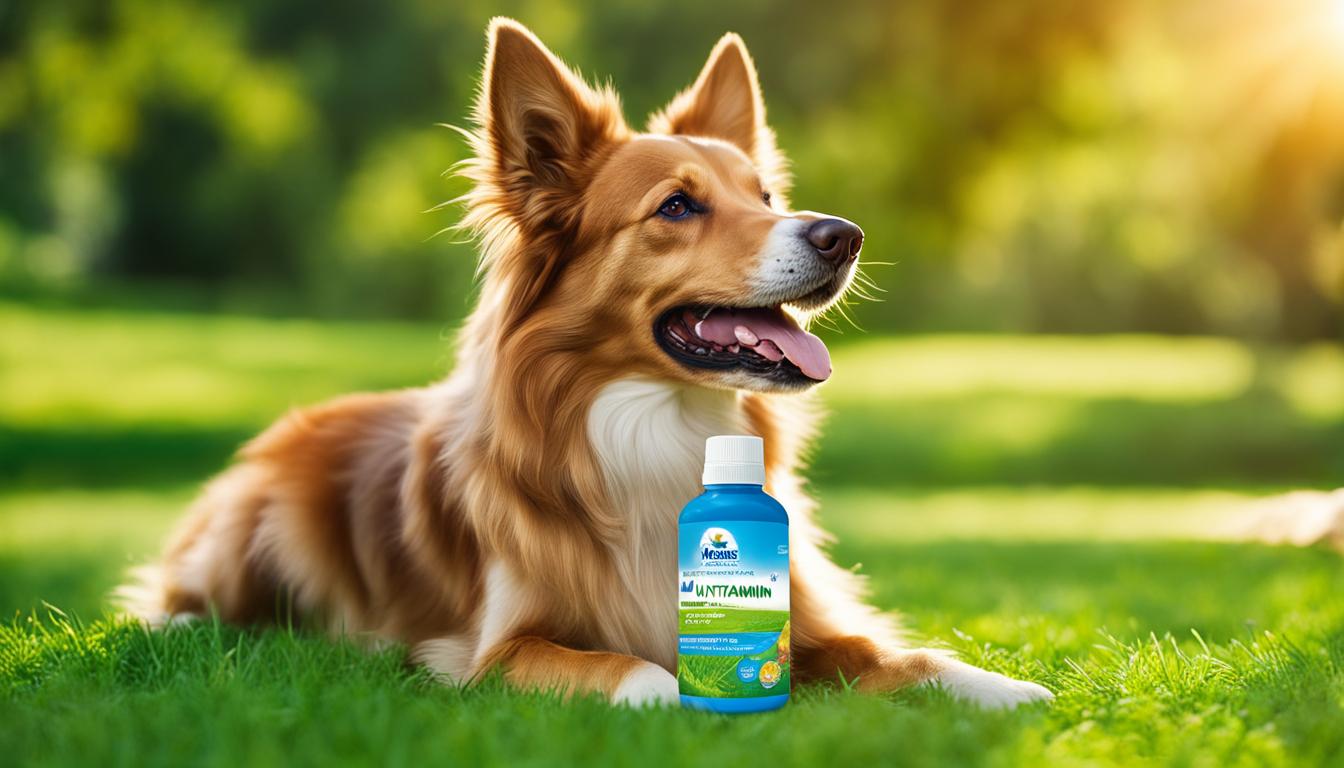Dogs are cherished members of our families, and their health and well-being are of utmost importance. As dogs age, they may face various health challenges, including joint discomfort and cognitive decline. To support their overall health, it is essential to provide them with a balanced diet, regular exercise, and appropriate nutrition throughout their lives.
Dog multivitamins, such as the top-rated Zesty Paws® Healthy Aging Supplement, can play a vital role in promoting healthy aging in dogs. These multivitamins contain a blend of essential nutrients that support cellular repair and replenish key vitamins and minerals. One of the key ingredients in these dog multivitamins is NAD+, which supports healthy cell function and increases cellular energy. By promoting cell regeneration, DNA repair, and gene expression, dog multivitamins contribute to vitality and zest for life in dogs.
Key Takeaways:
- Dog multivitamins can support healthy aging in dogs by replenishing essential nutrients.
- NAD+ is a key ingredient in dog multivitamins that supports healthy cell function and increases cellular energy.
- Dog multivitamins offer additional benefits like immune support, joint health, and environmental stress relief.
- Providing regular dog multivitamins can help dogs maintain their health and well-being as they age.
- Consult with a veterinarian to determine the best dog multivitamin for your pet’s specific needs.
Types of Dog Multivitamins
Dog multivitamins come in various forms to cater to different preferences and ease of administration. Pet owners can choose from chews, liquid, and tablets based on what works best for their furry companions.
H3: Chews vs. Liquid vs. Tablets: Choosing the Right Form of Dog Multivitamins
When selecting the most suitable type of dog multivitamins, it’s essential to consider factors such as taste, convenience, and the dog’s individual preferences. Here’s an overview of the three main forms:
- Chews: Dog multivitamin chews are treat-like supplements that dogs find enjoyable. They are often flavored, making them a tasty and enticing option. Chews are convenient and easy to administer since dogs view them as treats, eliminating the need for force-feeding or masking the supplement’s taste. Pet owners appreciate the simplicity of incorporating chews into their dog’s daily routine.
- Liquid: Liquid dog multivitamins can be mixed with food or water, allowing for easy consumption. They often contain additional fatty acids, such as omega-3, which provide enhanced benefits for the dog’s overall health. Mixing liquid multivitamins with meals ensures that dogs receive the necessary nutrients while enjoying their favorite food.
- Tablets: Dog multivitamin tablets offer a concentrated dosage of vitamins and minerals in a compact form. They are ideal for dogs that don’t enjoy chewable supplements or have specific dietary restrictions. Pet owners can easily administer tablets and ensure their dogs receive the recommended dosage without any hassle.
The choice between chews, liquid, and tablets ultimately depends on the dog’s preferences and ease of administration. It’s important to consider what will work best for the individual dog to ensure they receive their daily dose of essential vitamins and minerals.
Ingredients in Dog Multivitamins
Dog multivitamins contain a blend of essential vitamins and minerals that are crucial for supporting optimal dog health. These key nutrients work together to promote various aspects of your dog’s well-being, including vision, immune function, energy metabolism, bone health, and more.
Essential Vitamins for Dogs
Vitamin A: This essential vitamin plays a vital role in supporting vision health, immune function, and maintaining a healthy skin and coat.
B Vitamins: B vitamins, including B1, B2, B3, B5, B6, B9, and B12, are involved in energy metabolism, nerve function, digestion, and overall cellular health.
Vitamin C: Known for its immune-boosting abilities, vitamin C also supports joint health and aids in collagen production, promoting healthy skin and tissue.
Vitamin D: This vitamin promotes the absorption of calcium, essential for strong bones and teeth. It also helps regulate the immune system and supports overall health.
Vitamin E: As an antioxidant, vitamin E protects cells from oxidative damage. It also promotes healthy skin and coat, contributing to a shiny and vibrant appearance.
Vitamin K: Essential for blood clotting, vitamin K also supports bone health and plays a role in maintaining healthy teeth and gums.
Biotin: Biotin is known for its role in promoting skin, coat, and nail health. It also contributes to metabolic function and overall well-being.
Choline: Crucial for brain development and function, choline also supports liver health, making it an important nutrient for overall canine wellness.
Niacin: Niacin is involved in energy metabolism, skin health, and digestive function, supporting your dog’s overall vitality.
Riboflavin: Also known as vitamin B2, riboflavin supports energy production, vision health, and maintains healthy skin and coat.
Minerals for Dog Health
In addition to essential vitamins, dog multivitamins also contain important minerals that contribute to overall well-being and facilitate various bodily functions. These include:
| Mineral | Function |
|---|---|
| Calcium | Essential for bone health, muscle function, and nerve transmission. |
| Phosphorus | Required for energy metabolism, bone formation, and cell function. |
| Iron | Plays a crucial role in oxygen transport, supporting healthy red blood cell formation. |
Ensuring that your dog receives these essential vitamins and minerals through a balanced diet or with the help of a dog multivitamin can support their overall health and well-being. Talk to your veterinarian to determine the most appropriate multivitamin for your dog’s specific needs.
Dog Multivitamins for Specific Conditions
While dog multivitamins offer overall health support, certain formulations are specifically tailored to address specific conditions. These targeted multivitamins can provide additional support and promote optimal health in areas such as joint health, skin and coat, and immune function.
Targeted Support for Joint Health
Joint health is crucial for dogs, particularly as they age. Dog multivitamins for joint health often contain key ingredients like glucosamine and chondroitin. These compounds help support mobility, reduce joint discomfort, and promote overall joint health. By including these ingredients along with essential vitamins and minerals, these multivitamins provide comprehensive support to keep your dog’s joints functioning smoothly.
Targeted Support for Skin and Coat
A healthy skin and coat contribute to your dog’s overall well-being and appearance. Multivitamins designed for skin and coat health may contain essential nutrients like omega-3 fatty acids, biotin, and vitamin E. Omega-3 fatty acids help maintain a healthy coat and reduce skin inflammation, while biotin promotes coat growth and health. Vitamin E acts as an antioxidant, protecting skin cells from damage. These targeted multivitamins can enhance the health and shine of your dog’s coat, supporting skin health in the process.
Targeted Support for Immune Function
An effective immune system is crucial for your dog’s overall health and well-being. Dog multivitamins formulated for immune function often include antioxidants, vitamin C, and vitamin E. Antioxidants help protect cells from damage caused by free radicals, while vitamin C and vitamin E support the immune system’s ability to fight off infections and maintain overall health. By incorporating these immune-supporting ingredients, these multivitamins can help boost your dog’s natural defenses.
| Benefit | Key Ingredients |
|---|---|
| Joint Health | Glucosamine, Chondroitin |
| Skin and Coat Health | Omega-3 Fatty Acids, Biotin, Vitamin E |
| Immune Function | Antioxidants, Vitamin C, Vitamin E |
Age-Related Dog Multivitamins
Supporting Senior Dogs with Age-Specific Multivitamin Formulas
As dogs age, their nutritional needs may change, and it is important to provide them with the right support. That’s where age-related dog multivitamins come in. These specially formulated multivitamins are designed to meet the unique needs of senior dogs and help them maintain their health, energy, and well-being.
Age-related dog multivitamins often contain a combination of nutrients that target specific areas of concern for senior dogs. These may include:
- Glucosamine and chondroitin: These ingredients support joint health and mobility, which can be especially important for senior dogs experiencing age-related joint discomfort.
- Omega-3 fatty acids: Omega-3s are known for their anti-inflammatory properties and can help support heart health and maintain a healthy coat and skin.
- Antioxidants: As dogs age, their bodies are more susceptible to oxidative stress and cellular damage. Antioxidants, such as vitamin E and selenium, help combat the effects of oxidative stress and support overall cellular health.
- Cognitive support: Some age-related multivitamins may also include nutrients like DHA and EPA, which support brain function and cognitive health in senior dogs.
By providing age-specific multivitamin formulas, you can ensure that your senior dog receives the targeted support they need to thrive in their golden years.
| Benefits of Age-Related Dog Multivitamins for Senior Dogs |
|---|
| Supports joint health and mobility |
| Promotes a healthy coat and skin |
| Helps combat oxidative stress and cellular damage |
| Supports brain function and cognitive health |
How to Choose Dog Multivitamins
Considerations for Selecting the Best Dog Multivitamin
Choosing the right dog multivitamins requires consideration of several factors. By taking these considerations into account, you can ensure that your furry friend gets the best possible nutritional support.
1. Consult with a Veterinarian
Before selecting a dog multivitamin, consult with a veterinarian to determine your dog’s specific nutritional needs and any health concerns that may require targeted support. A veterinarian can provide valuable guidance based on your dog’s age, breed, size, and overall health.
2. Choose Reputable Companies
Look for multivitamins from reputable companies that adhere to stringent quality standards. Check for certifications from regulatory bodies like the National Animal Supplement Council (NASC), which ensures that the products meet high-quality standards for animal supplements.
3. Read Labels Carefully
Read the labels of dog multivitamins carefully to ensure they contain the necessary vitamins and minerals your dog requires. Avoid multivitamins that contain unnecessary fillers or artificial additives. Look for products that provide essential nutrients without unnecessary additives.
4. Consider Your Dog’s Preferences
Different dog multivitamins come in various forms, including chews, liquid, and tablets. Consider your dog’s preferences and choose a form of multivitamins that they will easily consume. Some dogs may prefer chews, while others may prefer liquid or tablets.
5. Follow Recommended Dosage
Follow the recommended dosage and feeding instructions provided by the manufacturer to ensure your dog receives the appropriate amount of vitamins. Overdosing on vitamins can have adverse effects on your dog’s health, so it’s important to follow the recommended dosage guidelines.
6. Monitor Your Dog’s Response
After introducing a new multivitamin, closely monitor your dog for any changes in behavior or well-being. If you notice any adverse effects, such as digestive issues or behavioral changes, consult with your veterinarian.
By carefully considering these factors, you can select the best dog multivitamin to support your dog’s health and well-being.
Feeding and Dosage of Dog Multivitamins
Guidelines for Proper Administration of Dog Multivitamins
Proper administration of dog multivitamins is crucial to ensure that your furry friend receives the maximum benefits. Follow these guidelines for feeding and dosing dog multivitamins:
- Follow the recommended dosage instructions provided by the manufacturer based on your dog’s weight. Every dog is unique, so it’s important to adhere to the specific guidelines.
- Some multivitamins may require splitting the dosage throughout the day for optimal absorption. Check the instructions to see if this applies to the multivitamin you’re using.
- Administer the multivitamin with or after a meal to minimize the risk of digestive upset. This can help ensure that the vitamins are properly absorbed.
- If you are using a liquid multivitamin, mix the recommended amount with your dog’s food or water as instructed. This will make it easier for your dog to consume.
- If your dog has difficulty consuming the multivitamin, consider hiding it in a treat or using a pill pocket. This can make the process more enjoyable for your pet.
- Regularly monitor your dog’s response to the multivitamin. Observe for any changes in behavior or well-being. If you notice any adverse effects, consult with your veterinarian.
Safety and Side Effects of Dog Multivitamins
Potential Risks and Precautions of Dog Multivitamin Use
When it comes to the safety of dog multivitamins, it’s important to be aware of potential risks and take necessary precautions. While these supplements are generally safe when used as directed, it’s essential to consult with a veterinarian before introducing them to your furry friend.
If your dog has underlying health conditions or is currently taking medications, it’s crucial to seek professional advice to ensure that the multivitamins are compatible with their specific needs. Your veterinarian can provide guidance on the appropriateness and potential interactions of the supplements.
Following the recommended dosage instructions is crucial to avoid potential harm. Overdosing on vitamins can be toxic to dogs and may lead to adverse effects. It’s important to carefully measure and administer the appropriate amount of multivitamins to ensure the well-being of your pet.
While using dog multivitamins, it’s essential to monitor your dog for any signs of adverse reactions. If you notice vomiting, diarrhea, or changes in behavior, it may be an indication that the multivitamins are not suitable for your dog. Discontinue use if necessary and consult with your veterinarian.
Always keep dog multivitamins out of reach of children and store them in a cool, dry place. While these supplements can be helpful in supporting your dog’s health, they should never replace a balanced diet and proper veterinary care. Remember to prioritize your dog’s individual needs and seek professional advice to ensure their well-being when using multivitamins.
FAQ
What are the benefits of dog multivitamins?
Dog multivitamins, such as Zesty Paws® Healthy Aging Supplement, can support healthy aging by replenishing essential nutrients like NAD+ that promote cell regeneration, DNA repair, and gene expression. They can also offer additional benefits like immune support, joint health, and environmental stress relief.
What are the different forms of dog multivitamins?
Dog multivitamins come in various forms, including chews, liquid, and tablets. Chews are treat-like and often flavored, making them a favorite among dogs. Liquid multivitamins can be mixed with food or water and may contain additional fatty acids. Tablets provide a concentrated dosage of vitamins and minerals.
What essential vitamins and minerals are found in dog multivitamins?
Dog multivitamins contain a blend of essential vitamins like A, B complex, C, D, E, K, biotin, choline, and niacin, as well as important minerals like calcium, phosphorus, and iron. These nutrients support overall health, including vision, energy metabolism, immune function, joint health, and skin and coat health.
Can dog multivitamins provide targeted support for specific conditions?
Yes, some dog multivitamins are formulated to provide targeted support for specific conditions. For example, multivitamins for joint health may contain glucosamine and chondroitin to support mobility, while those for skin and coat health may include omega-3 fatty acids, biotin, and vitamin E to promote a healthy and shiny coat. Multivitamins for immune function may contain antioxidants and vitamins C and E to support a strong immune system.
Are there age-specific multivitamins for dogs?
Yes, there are multivitamins specifically formulated for senior dogs. These age-specific formulas often contain ingredients like glucosamine, chondroitin, and omega-3 fatty acids to support joint health and mobility. They may also include antioxidants and nutrients that promote cognitive function and overall vitality in senior dogs.
How do I choose the right dog multivitamins?
It is important to consult with a veterinarian to determine your dog’s specific nutritional needs and any health concerns that may require targeted support. Look for multivitamins from reputable companies that adhere to stringent quality standards and have certifications from regulatory bodies like the National Animal Supplement Council (NASC). Read the labels to ensure the necessary vitamins and minerals are included without unnecessary fillers or artificial additives.
How should I administer dog multivitamins?
Follow the recommended dosage and feeding instructions provided by the manufacturer based on your dog’s weight. Some multivitamins may require splitting the dosage throughout the day for optimal absorption. Administer the multivitamin with or after a meal to minimize the risk of digestive upset. If your dog has difficulty consuming the multivitamin, consider hiding it in a treat or using a pill pocket.
Are dog multivitamins safe to use?
Dog multivitamins are generally safe when used as directed. However, it is important to consult with a veterinarian before starting your dog on multivitamins, especially if they have underlying health conditions or are taking medications. Follow the recommended dosage instructions to avoid overdosing on vitamins, and watch for any signs of adverse reactions. Keep multivitamins out of reach of children and store them in a cool, dry place.







